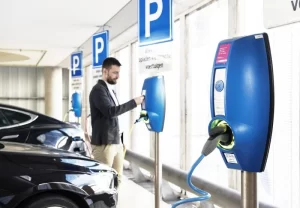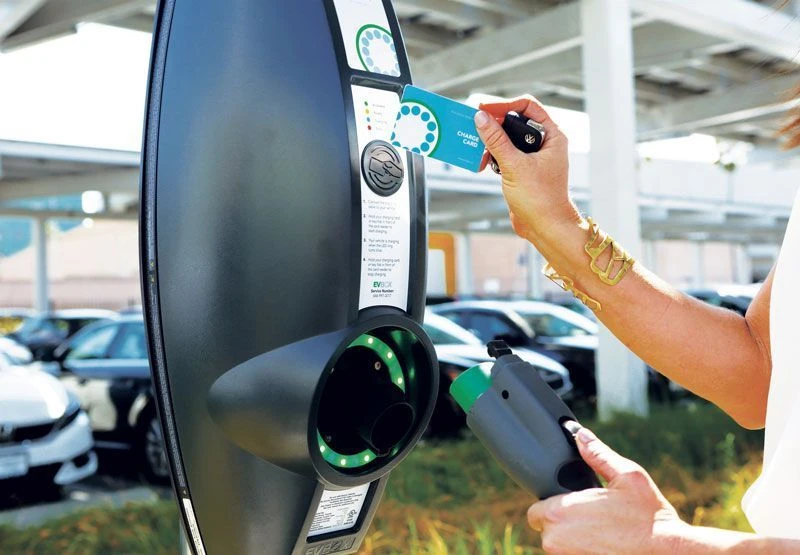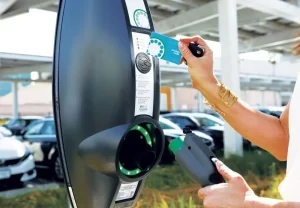Just like how long it takes to charge an EV, electric car charging cost depends on many variables, including where you charge or the type of vehicle you drive.
Before we go into more detail, here are the approximate costs of charging four different-sized vehicles (with small to large battery packs), at three different types of charging stations, so you can get a clear idea of the charging costs for your new EV.
Home charging -> $3 – $14
Public charging -> $8 – $28
Fast charging -> $14 – $47
Important: Prices for each charging segment are approximate based on our experience and do not represent a real situation. These calculations are based on an average charge calculation rate and represent the cost of charging from zero to 100 percent.
Electric car battery size
The first thing you need to know when calculating how much it costs to charge your EV is the size of the battery. As shown above, the larger the battery, the more kWh it can store; the more kWh it can store, the more energy it takes to charge the battery; the more power you need, the more you have to pay to charge your battery. Simple, right?
Vehicles with larger batteries cost more to charge, but can often go further on a single charge.
For example, a Porsche Taycan with a 90 kWh battery costs about $13.50 to fully charge at home but has a range of approximately 315 km (195 miles). However, a Fiat 500e with a much smaller 24 kWh battery, while costing a fraction of the price to charge, has a range of just 180 km (111 miles).
Once you know how big your new EV’s battery is (measured in kWh), you can make an approximation of how much it costs to charge at different charging stations. The three main options are at home, in public places or at fast charging stations.
1. EV charging cost at home
Charging from home is the cheapest way to charge your new car. Because there is no middleman standing between you and the cost of energy, you will always get the cheapest price available to home consumers.
Electric vehicle bill
How much it costs to charge at home is an easy equation. Just take your last energy bill find the price per kWh you pay at home and multiply it by the size of your battery.
On average, residential electricity prices range from around €0.10/$ at the low end in Europe and North America to €0.32/$ at the high end.
At the time of writing this guide, we have obtained some worldwide averages from Energybot (US), European Union (EU), and Nimblefins (UK):
United States: $0.10 per kWh
European Union: €0.23 per kWh
United Kingdom: £0.19 per kWh
This means that if you just bought a Tesla Model S with a 75 kWh battery and pay $0.15 for electricity, it will set you back $11.25 to fully charge your EV.
However, this calculation is only intended as an example as it does not take into account the current state of charge of the battery, the condition of your battery in general, weather conditions, or the type of charger.
2. Electric car charging cost at the public station
Public charging stations can range from business office chargers to roadside stations and commercial parking garages to shopping malls, restaurants, and hotels. The truth is that today, there is no shortage of businesses large and small investing in EV charging. At the same time, cities and governments are investing in EV charging infrastructure to power their sustainable transformations. When you put the two together, you have charging stations popping up everywhere.

Public charging stations can be Level 2 or Level 3 stations (AC or DC charging stations), but, for simplicity, we have divided them into two categories and will discuss them separately. As there is a middleman providing the service, public charging stations usually have a marked-down price compared to charging at home. How much it costs to fully charge depends on what the provider charges you for the service.
In some cases, such as workplaces and offices, the provider is also an employer and will offer the EV fee as an employee benefit and may pay less or even allow employees to pay for free. Others, such as parking facilities and shopping malls, will take the price of electricity and mark it up to profit, like any other service they provide. Some, such as restaurants and hotels, may use EV charging as a way to advertise and attract new customers.
As well as the diversity in how much it costs, how these providers will calculate costs also varies widely. Below is a list of the four most common ways to calculate charging rates.
Connection fee: a fixed amount for each session.
Energy tariff: a fixed price per kWh used during the charging session.
Time fee: Cost per minute or hour.
Service charge: A charge for providing the service.
For example, a charging provider might charge $0.30 per kWh with a $1 service fee, and if you’re charging a 75 kWh vehicle like a Tesla Model S, it will cost you $23.50 to fully charge it . As we said before, how much it costs depends entirely on the provider. That said, however, public charging is often faster than charging at home, and still cheaper than gas.
3. Electric car charging cost with a DC fast charger
Level 3 or DC charging is the fastest way to charge an EV. Depending on your vehicle’s power output and fast charging capabilities, it will likely take anywhere from seven minutes to an hour to charge your new EV to 80 percent full. These speeds make DC charging stations perfect for on-the-go locations such as highway rest stops, gas stations, or supermarkets.
However, DC charging stations are also the most expensive. To enable these charging times, DC charging stations must deliver serious amounts of power to a vehicle’s battery – think between 50 and 350 kW rather than the 22 kW, the maximum output for most AC charging stations.
DC charging infrastructure is much more expensive to purchase and operate, and as a result, charging service providers pay not only for the convenience but also for the additional costs incurred by the provider. In some cases, these providers can charge double, or even triple, the cost per kWh—making the costs here similar to the cost of filling your tank with fossil fuels. Typical costs can range from $0.55 per kWh with a $2 service fee to a flat rate of $0.99 per minute. This means that to fully charge the same Tesla Model S as above, it would be closer to $40 for a full battery. As such, DC fast charging is a convenience that comes closer in cost to what you’re used to paying for gas

Cost of electric car vs. gas
One of the questions we hear potential EV drivers ask us all the time is, are EVs cheaper to charge than filling up a conventional fossil fuel vehicle? While, as you may have guessed by now, the answer to this question is probably yes.
Regardless of charging costs for individual sessions, when you consider that most EV drivers charge at home, occasionally recharging when shopping or at work and reserving fast charging for long-distance journeys; Charging electric vehicles is usually much cheaper than filling up a car with petrol or diesel.


